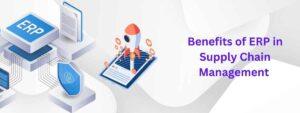Get in Touch
Streamline your business operations with Cloudmonte ERP, CRM, HRMS. Request a free demo and see how automation can boost your efficiency.
Streamline your business operations with Cloudmonte ERP, CRM, HRMS. Request a free demo and see how automation can boost your efficiency.

Supply chain executives nowadays are bored with depending on the same old methods that will enable them to manage things highly.
ERP systems in supply chain management used by many companies have been involved as a fundamental component of business processes. To get the raw materials and resources at the correct moment and quantity to bring completed items to market, manufacturers must engage with many suppliers and partners. Companies are concentrating especially on many supply chain tactics to increase plant output, improve product quality, and reduce manufacturing costs.
The integration of SCM becomes ever more crucial as the operations become more sophisticated worldwide. ERP software in supply chain management will handle many modes, including make-to-order, engineer-to-order, and configure-to-order, and provide operational assistance across several locations in real-time. From supplier to warehouse and lastly to store for client, ERP solutions simplify the journey their items follow. Companies may therefore prevent disturbance to their supply chains.
ERP-driven supply chain innovation moves quickly. This blog will help you more about it, whether you’re new to the field or have been working in it for a while. Keep an eye on us:
A full set of software tools and features that work together to make managing a company’s supply chain easier and more efficient. These are called ERP systems for supply chain management. This software lets you see and manage the whole supply chain. It helps you buy things, keep track of stores, handle orders, plan production, set up shipping, and send them out to customers.
It’s a primary tool that lets your team connect all your company’s offices as well as partners, sellers, and users outside of the company. This makes it easy for everyone to share information and work together.
As the hub of an organization’s operations and transportation, supply chain management in ERP software is an important part of modern business. Here is a more in-depth look at the many ways that ERP software helps with SCM:
1- Market Requirement and Planning
When orders come in, an ERP system designed for managing the supply chain can instantly make demand. ERP makes supply chain management easier by making it easier to schedule jobs. So, managers can see right away what resources are being used and what resources are being used. This helps them figure out when to send the goods. The best time to start production is when all stockpiles and raw materials are full. ERP makes sure that production plans match demand, that supplies are restocked at the right time, and that there isn’t too much inventory on hand.
2-Logistics
An ERP designed for SCM is a better way to keep track of the buying and selling of things, services, and other resources along the chain. The ERP system manages all parts of the supply chain, from the resources used in production and storage to the processes of transport and delivery. With ERP, it’s easy to handle jobs that used to be done by hand, like talking to customers and providers and keeping track of the messages.
3-Supplier Collaboration
The ERP program can make a statement that needs to be sent to the customer after the thing has been shipped. An ERP system helps keep track of all customer orders and shipping information in one place, so things get shipped on time. The system also has features that help choose the best way to package things and establish quality standards for both inside and outside packages. Companies can fix resource problems in the job list with the help of ERP.
4- Cost control
Costs can be kept under control in the supply chain with the help of ERP systems, which improve inventory levels, streamline processes, cut down on waste, and give real-time information. Lower running costs and higher profits are the results of these improvements.
5- Production
Each item’s BOM may be created in the ERP system. All machine and worker resource records are produced and updated in real-time when production begins. For appropriate supply chain management, the ERP system records all shipment documentation, reducing human mistakes. The system can send merchandise on time for delivery. Feature-rich ERP helps amend work orders and job assignments for last-minute changes to finish production on schedule.
6- Automation
ERP systems simplify the whole supply chain process by combining different supply chain tasks like managing assets, processing orders, and predicting demand. With ERP-driven technology in the supply chain, work gets done faster and costs go down.

Modern ERP systems improve performance across departments and key players like sellers and partners, which adds value to every part of the supply chain. When you automate the whole process, from buying the goods to delivering them, your overhead and running costs go down by a lot. The advantage of ERP software in supply chain management makes it easier for goods, money, and information to get from the provider to the customer. In the end, a strong ERP system designed for managing the supply chain helps stores keep full control over storage costs and meet customer needs.
Some of the most important things that ERP does for companies in the supply chain are.
Multiple supply chain brands like Amazon and Walmart rely on ERP systems for agile supply chain management.
Management of the supply chain the efficiency and competitiveness of an organization will be significantly impacted by the selection of an ERP system. Steps are mentioned below for choosing the right ERP.
ERP software has changed the way supply chain management is done in companies. That’s all there is to say about this article. There are a lot of benefits of ERP in supply chain management systems that can help make supply chain processes better and easier to use.
In the first place, ERP systems offer a single area where many business tasks can be done together, such as managing supplies, buying materials, and planning production. This merger removes data walls and lets teams work together in real-time, which makes things clearer and helps people make decisions. Furthermore, the data-driven insights that ERP systems for supply chain management provide allow businesses to correctly predict demand, get rid of unnecessary goods, and lower their holding costs. These tools also improve ties with suppliers by automating contact and keeping an eye on performance.
If you’re looking to improve your supply chain management capabilities with an ERP unique to your business needs. We help you create custom ERP software that fits your specific requirements. Enjoy full control and visibility over your supply chain activities by hiring a supply chain ERP development company
Cloudmonte Technologies is India’s leading Microsoft Certified Partner that caters to the needs of organization who can source next-gen Microsoft Business Apps from our highly skilled Microsoft consultants.
C-31 2nd Floor, Sector 6, Noida, Uttar Pradesh, 201301 India

PO Box 9009 RPO Madigan Plaza, Calgary, Alberta – T2A7Y8 Canada

209-9547 152 St, Surrey, BC V3R 5Y5,
Canada
6027 Sandhurst Lane Dallas TX 75206
USA
© 2018-2025 Created with cloudmonte